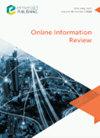影响研究者在开放获取中发表论文的因素:是自我决定还是自我强化的循环?
IF 3.1
3区 管理学
Q2 COMPUTER SCIENCE, INFORMATION SYSTEMS
引用次数: 3
摘要
本研究调查了来自不同学科的以色列研究人员对开放获取(OA)期刊和知识库中科学出版物的看法、态度和意识。设计/方法/办法研制了一种调查工具,分发给来自各大学、学院和研究机构的202名以色列研究人员。该研究使用技术接受和使用统一理论(UTAUT)模型作为工具,绘制已知影响研究人员在开放获取期刊和知识库上发表文章的因素。实证模型通过研究人员的行为意图(behavioral intention, BI)证实了研究人员感知与OA实际发表之间的中介作用。此外,研究人员在OA上发表论文的自我决策介导了BI。更具体地说,科研人员在OA中的发表水平不仅取决于BI介导的积极态度(Atti)、绩效预期(PE)和社会影响(SI),还取决于支持科研人员在OA中发表的条件,以及科学、技术、工程和数学(STEM)的学科隶属关系,这使得科研人员自愿在绿色和金色OA中发表。本研究通过制定和验证一个接受和使用的实证研究模型,有助于对开放获取出版的累积理解。研究结果对科学出版理论和实践的意义进行了讨论。原创性/价值本研究提出了一个有效的框架来理解研究者在开放获取中发表文章的最终决定。这项研究的结果是对研究人员采用和使用开放获取宣传的累积理解的重要一步,这是一个全球性问题,特别是在以色列的学术机构中。本文章由计算机程序翻译,如有差异,请以英文原文为准。
Factors influencing researchers to publish in open-access: Is it a self-decision or a self-reinforcing cycle?
PurposeThe current study examined Israeli researchers from various disciplines concerning their perceptions, attitudes and awareness of scientific publications in open access (OA) journals and repositories.Design/methodology/approachA survey instrument was developed and distributed to 202 Israeli researchers from universities, colleges and research institutions. The study used the united theory of acceptance and use of technology (UTAUT) model as a tool for mapping the factors known to influence researchers to publish in OA journals and repositories.FindingsThe empirical model confirmed the mediating effect of the association between researchers’ perceptions and the actual publishing in OA, through their behavioral intentions (BI). Furthermore, the BI are mediated by researchers’ self-decision to publish in OA. More specifically, a researcher's publication level in OA depended not only on the positive attitudes (Atti), performance expectancy (PE) and social influence (SI) mediated by BI, but also on conditions that support researchers who publish in OA, and disciplinary affiliation to science, technology, engineering and math (STEM) which lead the researcher to voluntarily publish in both green and gold OA.Research limitations/implicationsThis study contributed to the cumulative understanding of OA publishing by formulating and validating an empirical research model of acceptance and use.Practical implicationsThe implications of the findings for scientific publication theory and practices are discussed.Originality/valueThe study suggests an effective framework to understand the researcher's final decision to publish in OA. This study's results are an essential step towards the cumulative understanding of OA publicity adoption and use by researchers as a global issue in general and in Israeli academic institutions in particular.
求助全文
通过发布文献求助,成功后即可免费获取论文全文。
去求助
来源期刊

Online Information Review
工程技术-计算机:信息系统
CiteScore
6.90
自引率
16.10%
发文量
67
审稿时长
6 months
期刊介绍:
The journal provides a multi-disciplinary forum for scholars from a range of fields, including information studies/iSchools, data studies, internet studies, media and communication studies and information systems.
Publishes research on the social, political and ethical aspects of emergent digital information practices and platforms, and welcomes submissions that draw upon critical and socio-technical perspectives in order to address these developments.
Welcomes empirical, conceptual and methodological contributions on any topics relevant to the broad field of digital information and communication, however we are particularly interested in receiving submissions that address emerging issues around the below topics.
Coverage includes (but is not limited to):
•Online communities, social networking and social media, including online political communication; crowdsourcing; positive computing and wellbeing.
•The social drivers and implications of emerging data practices, including open data; big data; data journeys and flows; and research data management.
•Digital transformations including organisations’ use of information technologies (e.g. Internet of Things and digitisation of user experience) to improve economic and social welfare, health and wellbeing, and protect the environment.
•Developments in digital scholarship and the production and use of scholarly content.
•Online and digital research methods, including their ethical aspects.
 求助内容:
求助内容: 应助结果提醒方式:
应助结果提醒方式:


